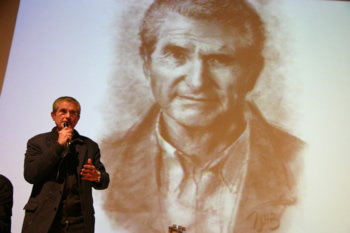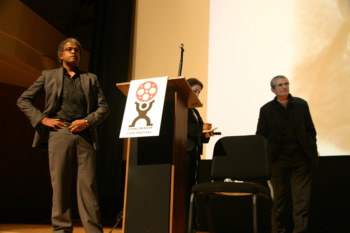Movies

New Releases • A-D • E-H • I-P • Q-Z • Articles • Festivals • Interviews • Dark Knight • Indiana Jones • John Wick • MCU
An Evening with Claude Lelouch
November 12, 2005
The King Center, Auraria Campus
Claude Lelouch has made more than 40 feature films in his career, including A Man and a Woman in 1966, which went on to win the Oscar for Best Foreign Language Film.

In addition to his prolific catalog of films, Lelouch is currently working on reviving the film industry in Afghanistan, including efforts to cultivate a film festival and renovate Kabul's largest theater.
The 68-year-old multi-talented writer, director, producer, and, yes, even actor, received a tribute at the 28th Starz Denver International Film Festival. On tap were his films A Man and a Woman, Les Miserables, and the new feature, The Courage to Love.
Following the screening of his latest movie, Elvis Mitchell conducted a brief on-stage interview with Lelouch. What follows are 10 questions that highlight the evening.
Q: Why is music so important to you in your films?
A: There are two kinds of intelligence: rational and irrational. Rational intelligence is the day-to-day life that we live; the fact that we are mortal and that we know it. The irrational intelligence is the part of us all that wants to believe we are immortal. It's the subconscious part of our intelligence. Music speaks to this subconscious level.
Q: People are afraid of love in your movies, sometimes.
A: It is more and more difficult to love someone. In contemporary times, it seems that it is getting more and more difficult. The times are actually killing love. Music is what brings hope to life. I don't like happy endings and I don't like sad endings, but I like endings that have hope. Music is what brings that element to a movie.
Q: The cities that the movies take place in our almost like characters, too.
A: It is cinema. Once you have a million people in a city, it makes for cinema. Paris and France, as a country, are very particular. There are more "critics" in France than there are people, actually, which makes for interesting "cinema."
Q: Talk about the way you use improvisation in your films versus scripts.
A: Cinema, for me, is like ice skating. There are some parts that are imposed, that I have to have. There are parts that are completely improvised and free. The improvisation is the part that makes for the richness of the film and takes it in diverse routes that were not predicted.
Q: Like jazz?
A; It is a lot like jazz. Life is never the way it is expected at all. If it is a little bit better than expected, then it is the beginning of happiness. If is a little bit less, then it is shit.
Q: How much did this film change from the beginning to the end?

A: There is a main theme and there are four variations of this film. This is the best one for international audiences. (Note: Lelouch said all four versions of The Courage to Love to will be on the DVD.)
Q: Do you think that first version would not play so well in America?
A: The first one is very French and even the French don't understand it very well.
Q: How important are the critics to you?
A: If I had listened to the critics I would not have made movies.
Q: Do you listen to the audiences or to your heart?
A: I prefer to listen to my own subconscious and to irrational thought. I think it's about instinct. Critics are too rational. Critics like two kinds of films: either independent films or big blockbuster films. But they don't really understand films that cross both lines.
Q: What would you do with a real "Hollywood" budget?
A: With King Kong"s budget I would've made my 40 movies.
• Originally published at MovieHabit.com.


